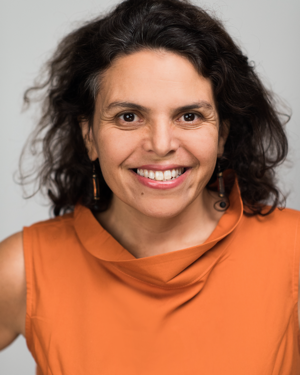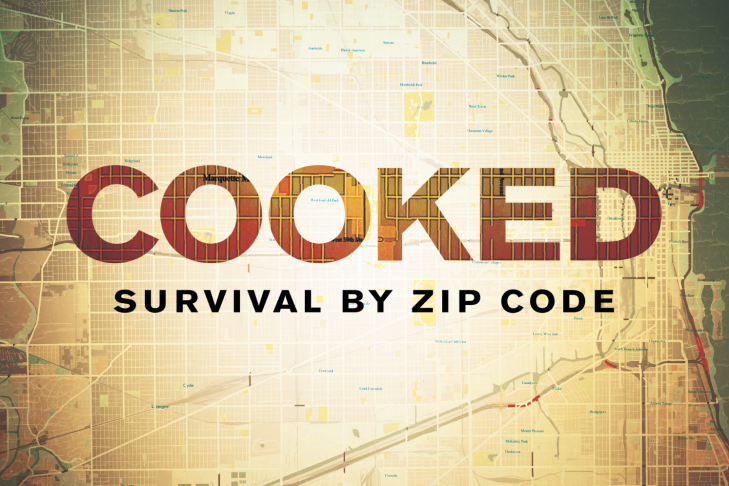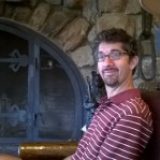With natural disasters back in the headlines due to Hurricane Dorian, a new documentary with upcoming local screenings asks what happens when disaster response occurs on an unequal basis.
“Cooked: Survival by Zip Code,” directed and produced by Jewish-American filmmaker Judith Helfand, addresses natural disasters of the past few decades, focusing on the Chicago heat wave that claimed 739 lives in July 1995.
“I couldn’t believe I hadn’t heard about it,” Helfand said of the heat wave, which she first learned about from Eric Klinenberg’s 2003 book “Heat Wave: A Social Autopsy of Disaster in Chicago,” on which her film is based. Her film synopsis states that those who died were “mostly black and living in the city’s poorest neighborhoods.”
The film shows grim footage related to the heat wave: air-conditioning trucks that stored cadavers after the city morgue capacity was overwhelmed, residents who did not install air conditioners due to fears of burglary and a decorated war veteran who became a casualty. Using a map of the city, Helfand finds links between poverty, race and inequality of outcome in the wake of a natural disaster—links she continues to explore when traveling to more affluent communities in the region and beyond that can marshal more resources for disaster preparedness.
Citing Klinenberg, she said an instance of cataclysmic disaster can reveal the “social fault lines underlying a city,” which she explains can be economic, racial and social fault lines. “It seemed like a one-off [event like the heat wave] could teach us a lot,” she said.
But as the Peabody Award-winning filmmaker worked on “Cooked,” she noticed more and more such one-off events—Hurricane Katrina in New Orleans in 2005 and Hurricanes Irene and Sandy in 2011 and 2012, respectively, in her hometown of New York. For both Irene and Sandy, Helfand, who grew up in a middle-class Jewish family on Long Island, moved in temporarily with her mother, Florence. “I did not want her to be alone,” Helfand explained. “It was great to be with her. She was somewhat more prepared than I was.” As for her brother, Alex, she calls him a “disaster master,” noting that he was able to get a generator.

Helfand kept the camera on her family while thinking about others who did not have access to generators or relocation, describing this as the “best way” to spotlight a power structure “designed over many decades and years to divide us socially and economically. It actually divides us from a rescue perspective.” When Hurricane Maria ravaged Puerto Rico in 2017, it divided the population into those who “have generators and who did not have generators,” she said. “People who had them survived. People who did not have them did not survive. Huge numbers died in Maria.”
September marks National Preparedness Month, and there will be screenings of “Cooked” next week in Cambridge and Boston.
“This film reminds us that the issue isn’t only about extreme weather and climate change, but about the deeper social issues of poverty and racism and how they impact overall health,” said Claude Jacob, chief public health officer and director of the Cambridge Public Health Department.
This summer, when the temperature surpassed 100 degrees, Cambridge opened its libraries as shelters. John Bolduc, an environmental planner with the Cambridge Community Development Department, described this as a standard policy and said, “A lot of people don’t have air conditioning at home and need a place to cool off when it gets really hot.” Bolduc foresees that by 2030 there will be over 30 days a year over 90 degrees, and by 2070 there will be 40 to 70 such days “if greenhouse gas emissions and the fossil fuels we burn increase at the current rate.”
“There’s a lot of interest in Boston and Massachusetts to really address the future threat of climate change from a climate justice perspective,” Helfand said. “I’m really trying to work on that.”
Helfand is working on other projects as well. She said she’s “trying to finish a new movie,” “Love & Stuff,” about dealing with the death of her mother in hospice while processing what to do with her mother’s belongings. She has also released a short film, “Absolutely No Spitting,” about adopting a daughter who is African American, which Helfand said has helped her see “Cooked” in a new way.
“I started this film about the weather and ended the movie about the long-term impact of extreme racism meeting extreme weather,” Helfand said. “My daughter asked me a lot of questions. When there are people on the street with no place to sleep, or who are hungry, she asks me why. I had not put it together. Ninety-nine percent of the time, they are black. She is black. This put it all together, the linkage, what do they all have in common.”
Helfand added: “I’m going to have to explain to her how deep-seated inequality and inequity forms the city we live in, the neighborhood I grew up in on Long Island. I can point to ‘Cooked,’ to the problem, how it happens, part of the reason why so many people you are seeing [who are harmed] are black [and] what we have to do about it.”
The answer, she said, includes “community-based climate justice solutions…a kind of revitalization, rebuilding, care, a neighbor-to-neighbor thing.” In Chicago, she said, there are “organizations that, I thought, are trying to address inequity, job-seekers, job training.”
As she reflected, “There could be multiple solutions that begin to address multiple problems.”
“Cooked: Survival by Zip Code” will be screened at 6:30 p.m. on Thursday, Sept. 26, in Cambridge as part of Climate Preparedness Week. Find more information here. The film will also be screened at 11 a.m. on Friday, Sept. 27, at John D. O’Bryant African American Institute at Northeastern University. Find more information here.



